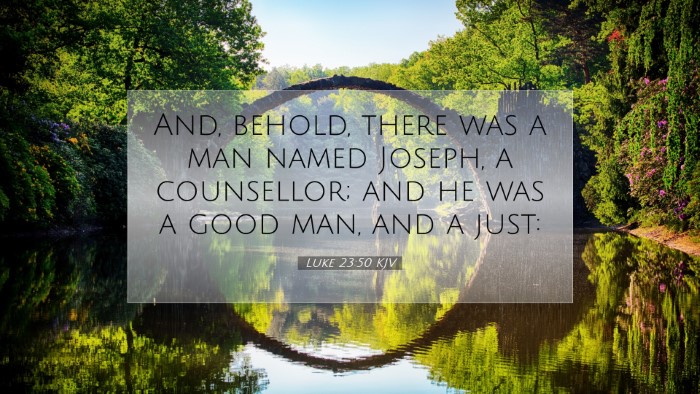Commentary on Luke 23:50
Verse Text: "And, behold, there was a man named Joseph, a councillor; and he was a good man, and a just:" (Luke 23:50, KJV)
Introduction
Luke 23:50 introduces us to Joseph of Arimathea, a significant figure in the narrative of Jesus' crucifixion and burial. This brief yet profound description encapsulates not only his identity but also sets a stage for understanding the moral and spiritual realities surrounding the events of the Passion. The deep implications of this verse warrant a careful examination through various insightful commentaries.
Character of Joseph of Arimathea
This verse describes Joseph as a "good man" and "just." Such descriptions are essential in emphasizing the moral integrity of Joseph, especially in stark contrast to the prevailing attitudes among many members of the Sanhedrin who had condemned Jesus.
- Matthew Henry Notes: Matthew Henry emphasizes Joseph's virtuous character as a reflective quality of faith amidst corruption. His goodness highlights the rarity of authentic righteousness within the leadership of Israel at that time.
- Albert Barnes Commentary: Barnes mentions that Joseph was a member of the council, indicating that he was in a position of influence, which makes his actions even more significant. His just nature suggests he acted in accordance with truth and justice, which was deeply compromised during the trial of Jesus.
- Adam Clarke's Commentary: Clarke notes the importance of the term "just," implying that Joseph not only adhered to the law but also practiced kindness and compassion. This virtue positioned him uniquely as a true disciple among the apostolic witnesses.
The Context of Authority and Discipleship
Joseph's role as a councillor indicates significant authority and status. However, his willingness to align with Christ, especially after His death, speaks volumes about his priorities and understanding of Jesus' mission.
- Moral Courage: Henry observes that Joseph’s actions depict considerable moral courage. Despite the risks associated with associating with a condemned criminal, Joseph openly identified with Jesus. This willingness to embrace his faith in an adverse environment serves as a model for all believers.
- Contrasting Responses: Barnes highlights the differing reactions to Jesus' crucifixion. While many of his followers fled, Joseph steps forward, which terrifies many a believer today who face pressure in their workplaces and communities to publicly embrace their faith.
- Clarke's Perspective on Authority: Clarke suggests that Joseph's position did not deter him from pursuing justice and righteousness. His example reminds us that true authority is demonstrated through humble servitude and bold witness, even when facing personal risk.
Theological Implications
The verse also raises profound theological implications regarding the nature of discipleship and God's providence. Joseph’s actions after the crucifixion fulfill prophetic symbolism and highlight the continuum of God's redemptive plan, even through individuals of standing who take a righteous stand.
- God's Providence: Henry suggests Joseph’s providential role in the burial of Jesus signifies God's control over every aspect of Christ's life and death. The mention of a righteous man caring for Jesus’ body points to a divine orchestration, reassuring the faithful of God's purposes.
- Fulfillment of Scripture: Barnes points out that Joseph of Arimathea’s actions fulfill Isaiah 53:9, which foretells that the Messiah would be buried with the rich. This realization contextualizes the significance of righteous actions within the framework of prophetic fulfillment.
- New Life in Christ: Clarke notes that believers should draw inspiration from Joseph's example of taking initiative in burial, which symbolizes new life. Just as Joseph's act preserved Jesus' body, our faith sustains His legacy through evangelism and discipleship.
Application for Today’s Believers
In today’s context, the character and actions of Joseph offer rich lessons about integrity, faith, and the courage to stand for truth amid opposition.
- Courage to Stand: Believers are encouraged to exhibit the same courage as Joseph when faced with societal and cultural pressures. Joseph did not let his position and the possible repercussions deter him from doing what was right.
- Integrity in Leadership: Joseph serves as a model for those in positions of influence. He challenges modern leaders to lead with integrity and righteousness, giving voice to the teachings of Jesus Christ.
- Embracing Discipleship: Joseph’s case solidifies the understanding that discipleship requires action—being willing to invest in one’s faith proactively, which calls for tangible acts of service and sacrifice.
Conclusion
Luke 23:50 presents a compelling portrait of Joseph of Arimathea as a beacon of goodness and righteousness amidst a tumultuous time. Insights from various commentators emphasize the significance of his character, the courage demonstrated in his actions, and the theological depth represented in his role in the burial of Christ. For pastors, students, theologians, and Bible scholars, this verse serves as a reminder of the power and necessity of living a life of integrity, especially as followers of Christ. The legacy of Joseph challenges us to consider how we might similarly respond to Christ in our own lives.


